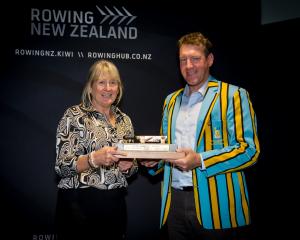
The crew of John Parnell (65), Rob Hamlin (47), Russell Garbutt (61) and John Letts (66) lifted the trophy when they won the handicap section of the coxless four.
The win upset the Avon four that included former New Zealand representatives George Keys, Dave Lindstrom and Warren McLaughlin, who were the defending champions, and the Aramaho (Wanganui) crew that had trained every day for the past few months.
"It was the first time we had rowed together in a regatta as a crew," assistant club captain Russell Garbutt said.
"We are still a bit bemused and befuddled at our success."
Masters rowing has brought old rowers back to the sport and encouraged others to try the sport for the first time.
Garbutt and Letts returned to their roots in Dunedin, Hamlin came south from the West End club in Auckland, and Hamlin joined from England.
There were 280 rowers at the championships, and the Otago crew were chuffed at their success.
The first duty on returning home was to paint the rooster in the Otago club colours to continue the tradition and conditions of the trophy.
In New Zealand rowing circles, the winning premier coxed four receives the Boss Rooster trophy. The Mock Rooster is a take-off of this.
Dunedin man Jack Coker, who rowed competitively for about six years, read about the Boss Rooster and made a similar one, which is now given to the coxless four that wins on handicap. The winning crew in the Boss Rooster race has to paint the tin rooster, which was created in 1897.
The trophy was originally the prize in a grudge match between the Queens Drive and Port Chalmers Clubs.
Tradition dictates that the winning crew must paint the rooster in their club colours within an hour of victory, or forfeit a keg of beer to the losers.












